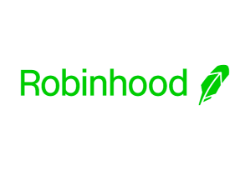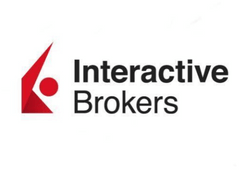Best Discount Brokers
In a world where technology keeps advancing, people have become accustomed to the comfort of online transactions, even for buying and selling stocks.
In fact, this accessibility has popularized trading even for those who may not have had the time to go to their closest stock exchange.
The leading discount brokers offer a wide range of services, low commissions, and user-friendly platforms.
This article takes a look at the market’s top solutions to see what makes them stand out
Best Discount Brokers in March 2026
Robinhood
Fortunly's Rating: Our editorial team determines the rating based on a set of evaluation criteria developed for each product and service category.

Robinhood is a commission-free brokerage that offers users a simple, easy-to-use platform and mobile app. It was founded in 2013 with the mission of making financial services accessible to everyone. Robinhood allows users to buy and sell stocks, ETFs, options, and cryptocurrency without fees or commission. Its Gold account features include margin investing and extended-hours trading. Read more
- •Good cash management
- •No account minimums
- •Supports crypto trading
Fidelity
Fortunly's Rating: Our editorial team determines the rating based on a set of evaluation criteria developed for each product and service category.

Fidelity is a well-rounded service, with low commissions, excellent customer service, and powerful research tools. It’s one of the oldest US-based brokers. Founded in 1946, it has since helped more than 40 million people make confident investment decisions. Fidelity’s wide range of products and services includes individual and joint brokerage accounts, retirement plans, college savings plans, and more. Read more
- •Detailed ETF research
- •No commissions on stocks and ETFs
- •Large research tool selection
Webull
Fortunly's Rating: Our editorial team determines the rating based on a set of evaluation criteria developed for each product and service category.

Webull is a powerful and intuitive commission-free online broker for trading stocks, ETFs, options, and cryptocurrency. The company started its journey in 2017 and quickly became one of the most popular brokers on the market. Webull’s top features are real-time quotes, technical indicators, economic calendars, margin trading, charts, news, and more. Read more
- •Pre-market trading
- •Commission-free trading on US-listed stocks, ETFs, and options
- •Handy mobile app
Interactive Brokers
Fortunly's Rating: Our editorial team determines the rating based on a set of evaluation criteria developed for each product and service category.

Interactive Brokers is a commission-free trading platform for stocks, ETFs, and other assets. It is an excellent choice for active traders looking for a robust and user-friendly platform. Interactive Brokers was founded in 1978. The company is headquartered in Greenwich, CT, and has offices worldwide. Read more
- •Low fees
- •Wide array of securities
- •135+ markets
Top 4 Discount Brokers - Our Picks for 2026
Robinhood
Fidelity
Webull
Interactive Brokers
Our Methodology for Evaluating Discount Brokers
These days, more and more people are looking for ways to cut costs and manage their investments in a smarter way. And while there are plenty of options out there, not all of them are equally functional and reliable.
During our research of discount brokers, we looked at factors such as commission, fees, account minimums, research tools, customer service, and overall user experience (i.e., platform quality and ease of use). Here are our criteria:
Commissions and Fees
The investment options with online brokers mirror their brick-and-mortar counterparts: Stocks, ETFs, and mutual funds are all par for the course. Some even offer cryptocurrency and futures trading.
You can find plenty of commission-free discount brokers among them, but these platforms have to make up the costs somewhere.
That usually means they’ll have higher account minimums or fewer research tools. Also, be on the lookout for per-trade fees: These will factor into every trade you make, so they should be a significant factor in your decision; the broker you choose should have competitive rates.
Account Minimums
The account minimum is the amount of money you need to deposit before you can start trading.
The good news is, many discount brokers don’t have a minimum deposit requirement, but it’s not always easy to find this information.
They do usually have a minimum deposit, but it’s pretty low, allowing them to cover their necessary expenses, while maintaining low overhead for aspiring traders.
Research Tools
Experienced investors and beginners alike need research tools to make informed decisions.
You’ll find stock screeners, newsfeeds, analyst ratings, real-time quotes, and more.
Educational resources, such as webinars and articles, are another common feature, and can be helpful to investment rookies and veterans who want to brush up on a particular subject.
User Experience
Most discount brokers have platforms that are easy to navigate and use, ideally with a mobile app alongside the desktop interface.
Trading is already pretty complicated - the last thing you need is a broker making your life even more difficult.
Mobile app quality is equally important, as more and more people are trading on the go; you don’t want to miss out on any opportunities because you can’t access your account from your phone or tablet.
Customer Service
The broker you choose should provide reliable and efficient support. This includes 24/7 customer service, as well as a variety of contact options (phone, email, and live chat).
Check the reviews, too: Your chosen broker must have a good reputation for providing enviable customer service.
Detailed Reviews of Discount Brokerages
Robinhood

If you’re new to investing and wish to start with a simple platform, Robinhood could be just the thing. It’s one of the most popular brokers on the market, thanks to its $0 commission on all online US stock, ETF, and options trades.
It’s a great platform for those who are just dipping their toes in the world of investing and don't want to overspend while they learn the ropes. Just like Fidelity, Robinhood doesn’t have account minimums.
However, if you’re looking for a more comprehensive experience, you might want to go elsewhere. With Robinhood, investors can only trade US-exclusive stocks and options, ETFs, or cryptocurrency. On the downside, this platform does not offer mutual funds or bonds.
Robinhood’s research resources also leave plenty to be desired in comparison to other brokers. If you’re looking for a platform where you can learn as much as possible before investing, Robinhood might not be the best choice for you.
However, if you’re an investor who knows what they want or doesn’t mind doing their research elsewhere, Robinhood could be a great option.
Those looking for more powerful tools and advanced features can sign up for the Robinhood Gold account for a $5 monthly fee or 3% of your trades if your margin surpasses $1,000. The advanced features include margin investing, level II market data from Nasdaq, bigger instant deposits, and professional research from Morningstar.
There’s also a 30-day free trial for testing out the platform and seeing if it’s right for you. If you wish to try margin investing during the trial, be advised that you'll be charged 3% yearly interest on any amount you borrow over $1,000.
Robinhood’s reputation for easy access has a lot to do with its excellent mobile app for iOS and Android devices. It's incredibly user-friendly, with a clean design and quick access to all the features you need.
In terms of customer service, Robinhood has an in-depth help center for self-starters, but you can also reach its support by phone 24/7. All you need to do is log into your account and tap on the "Contact Us" button.
All in all, Robinhood is a great choice for beginner investors looking for an easy and cheap gateway to trading. However, more experienced investors might want to consider other solutions with more extensive research resources and investment options.
Fidelity

Fidelity has been an industry staple for over 75 years, and for good reason. It all started in 1946, when Edward C. Johnson II founded the company. Today, Fidelity has more than 52,000 associates worldwide, over $11.8 trillion in assets under administration, more than $4.5 trillion in total discretionary assets, and 2.8 million daily trades on average.
Its investment options include stocks, ETFs, mutual funds, and more. This is a commission-free broker, with no account minimums; you only pay what is stated upfront.
The $0-commission rule applies to online US stock, ETF, and options trades, although the last do have a $0.65 per-contract fee. Fidelity also has some of the most competitive margin rates in the industry, going as low as 4.25% for the highest trade volumes.
One of Fidelity’s unique features is called Cash Management: With it, you earn interest on your uninvested cash, get free ATM withdrawals and check-writing, as well as a debit card with no foreign transaction fees. You can use this account to easily transfer money to and from your investment account without fees or minimums.
Another thing that makes Fidelity stand out is its Stock Plan Services. They help employees track and administer their stock plans, including equity compensation plans, stock options, and restricted stock plans.
Fidelity’s research resources include a variety of analyst ratings, real-time stock quotes and indexes, market news, webinars, and articles. Investors can use these to enhance their trading portfolios and seek advice from experts.
When it comes to trading on the go, Fidelity’s mobile app is user-friendly and available for both iOS and Android devices. It boasts the same features as the desktop platform. Both versions of the platform are intuitive, and provide top-notch user experience.
Fidelity’s customer service can be accessed via phone, email, and live chat. Phone support is available 24/7, while the live chat is staffed Monday through Friday from 8 a.m. till 10 p.m. (ET) and from 9 a.m. till 4 p.m. (ET) on weekends.
There’s also a ‘round-the-clock Virtual Assistant ready to answer any questions you may have. As you can see, Fidelity’s excellent reputation for providing quality customer service is wholly warranted.
Webull

Webull is another reliable stock broker. Its product array contains stocks, options, fractional shares, ETFs, and ADRs. It allows traders to invest in thousands of companies and fractional shares with as little as $5 and offers several types of brokerage accounts to accommodate different trader needs.
Webull is one of the newest names in this industry: It was founded in 2017 and headquartered in New York City. Since its very beginning, Webull has been focused on providing the best possible experience to its clients.
Webull’s trading arsenal covers various order types and trading functions. It also provides a bundle of in-depth analysis tools to help traders make better investment decisions. These include various screeners, intuitive charts, data, and news for comparing trends and companies.
If you're into margin trading, you can start a margin account, which would allow you to borrow funds from Webull to trade on margin. You would need to have at least $2,000 to qualify for it, and the annual interest rate is 6.99%, provided your balance ranges from $0 to $25,000.
One of the great things about Webull is that it frequently runs promotions where you can get free stocks for fulfilling relatively easy conditions. At the time of writing this article, this brokerage is offering five free stocks for anyone who opens a Webull brokerage account and makes an initial deposit of any amount.
Another thing we like about Webull is its mobile app: Available on both major OSs, the app packs all its features in a sleek, user-friendly design - everything you need is just a few taps away.
Webull’s commitment to customer satisfaction and education is truly outstanding. You can reach the site's support representatives via phone or email, or go through the broker’s informative FAQ section and an extensive blog with educational articles. Users can also join one of the many active trading groups to exchange opinions and get insights and investment advice from experienced traders.
To sum up, Webull is an excellent choice for those looking for a platform without commission fees and account minimums. It offers a wide range of investment products, trading tools, resources, and a great mobile app. However, it is essential to note that the broker is geared towards more experienced investors.
Interactive Brokers

Interactive Brokers is a trustworthy, multi-asset platform that has been around for more than four decades. It was founded in 1978, and its headquarters are in Greenwich, CT. The broker is listed publicly on Nasdaq and regulated by the SEC, FINRA, NYSE, and other relevant regulatory bodies.
Interactive Brokers provides a wide range of assets, including stocks, options, futures, forex, bonds, and ETFs. It also offers low-commission cryptocurrency trading, ranging from 0.12% to 0.18% of the trade value; traders can seamlessly access crypto markets through Interactive Broker’s intuitive web, desktop, and mobile platforms.
With Interactive Brokers, traders get access to more than 130 market centers across more than 30 countries. This advanced platform also provides numerous trading tools, such as market scanners, backtesting, and probability calculators.
One of the main advantages of Interactive Brokers is its tiered commission structure: The more you trade, the lower your commissions will be. The wide range of order types is another great asset, especially for experienced traders. This can help limit risk, speed up trade execution, and simplify the overall trading process.
Interactive Brokers has separate platforms for web, desktop, and mobile trading, as well as the Trader Workstation for active traders and investors who trade multiple products and need more power and flexibility. There’s also the IBKR Mobile app for those who want to trade on the go using their iOS or Android devices.
The IBKR GlobalTrader platform allows users to easily trade global stocks and cryptocurrencies. The IBKR APIs are also available for those who want to develop their own trading software and build custom trading applications.
There are also a few downsides: For one, the platform can be confusing for new traders, and even veterans may need some time to get used to it.
When it comes to customer support, Interactive Brokers has in-depth FAQs, user guides, and a knowledge base. If you wish to get in touch with one of the platform’s support agents, you can do so via email, phone, or live chat. So, if you need any guidance or assistance, you will be able to get it in just a few clicks.
All things considered, Interactive Brokers is a fantastic choice for active traders and professionals who wish to trade a wide range of assets at low commissions. It offers low commissions, advanced trading tools, and excellent customer support.
It’s also a good choice for those who want to develop their own trading software. However, it's not the best option for beginners, as it can be a bit overwhelming.
What Are Discounts Brokers and How Investors Can Benefit From Them
In short, a discount brokerage is an online broker that allows you to invest in ETFs, stocks, mutual funds, and other investment products without having to pay commissions or fees. You can save a lot of the money you make through trading this way.
Discount brokerages have become increasingly popular in recent years, with good reason - they offer a number of benefits helpful to experienced investors and beginners alike. Here are some of them.
Low Trading Fees
As their name suggests, the primary benefit of using discount brokers is saving money on commissions and fees.
In some cases, you may not have to pay any commission at all. On the other hand, traditional brokerages often charge a percentage for every trade you make, taking tens of dollars or more each time.
Wide Selection of Investment Products
The investment options in discount brokerages are pretty standard: Stocks, ETFs, mutual funds, options, futures, forex, etc. If you’re looking to invest in a particular product or sector, chances are you'll be able to do so at a discount broker.
Information Access
When you use a discount broker, you also have access to a wealth of information and research tools. This can help you make smarter investment decisions and increase your chances of success.
Some brokerages also offer various educational resources, which can be extremely helpful, especially for inexperienced traders.

